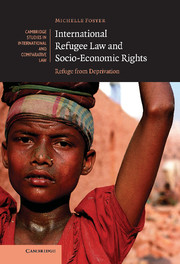Book contents
- Frontmatter
- Contents
- Acknowledgements
- Table of cases
- Table of treaties and other international instruments
- List of abbreviations
- 1 Introduction
- 2 A human rights framework for interpreting the refugee convention
- 3 Persecution and socio-economic deprivation in refugee law
- 4 Rethinking the conceptual approach to socio-economic claims
- 5 Economic deprivation as the reason for being persecuted
- 6 Economic disadvantage and the Refugee Convention grounds
- 7 Conclusions
- Bibliography
- Index
- CAMBRIDGE STUDIES IN INTERNATIONAL AND COMPARATIVE LAW
2 - A human rights framework for interpreting the refugee convention
Published online by Cambridge University Press: 21 July 2009
- Frontmatter
- Contents
- Acknowledgements
- Table of cases
- Table of treaties and other international instruments
- List of abbreviations
- 1 Introduction
- 2 A human rights framework for interpreting the refugee convention
- 3 Persecution and socio-economic deprivation in refugee law
- 4 Rethinking the conceptual approach to socio-economic claims
- 5 Economic deprivation as the reason for being persecuted
- 6 Economic disadvantage and the Refugee Convention grounds
- 7 Conclusions
- Bibliography
- Index
- CAMBRIDGE STUDIES IN INTERNATIONAL AND COMPARATIVE LAW
Summary
PART ONE: THE DEVELOPING HUMAN RIGHTS FRAMEWORK
One of the most significant developments in refugee law jurisprudence in recent years has been the well-documented move towards an understanding of ‘being persecuted’, as well as other elements of the definition, that is informed and understood in the context of international human rights standards. This approach to interpretation was advocated as early as 1953, when Vernant suggested that ‘persecution’ should be equated ‘with severe sanctions and measures of an arbitrary nature, incompatible with the principles set forth in the Universal Declaration of Human Rights’. However its widespread acceptance is undoubtedly a result of the ground-breaking analysis produced by Hathaway in 1991, in which he proposed that persecution is best understood as the ‘sustained or systemic violation of basic human rights demonstrative of a failure of state protection’. Hathaway proposed that the treaties comprising the ‘International Bill of Rights’ (‘IBR’) – the UDHR, the ICCPR and the ICESCR – could provide a framework for measuring whether the nature and seriousness of harm in a specific case amounts to ‘being persecuted’. This development has been extremely significant in a number of ways and has been central to the ability of the Refugee Convention to be interpreted in a progressive manner in order to encompass claims involving, for example, gender-based persecution. It is particularly important in light of the central thesis of this book, in that the inclusion of socio-economic rights in both the UDHR and ICESCR provides persuasive authority for the view that violations of socio-economic rights may amount to persecution.
- Type
- Chapter
- Information
- International Refugee Law and Socio-Economic RightsRefuge from Deprivation, pp. 27 - 86Publisher: Cambridge University PressPrint publication year: 2007

